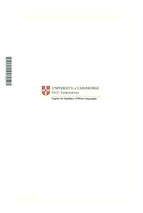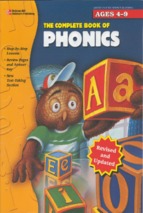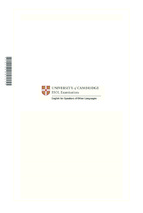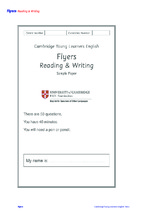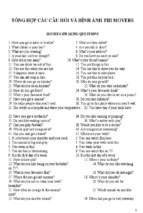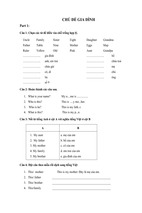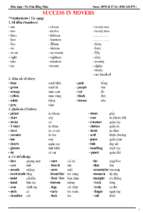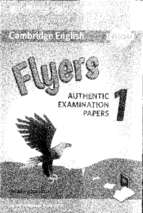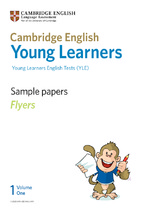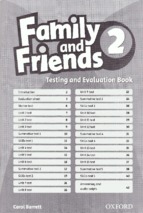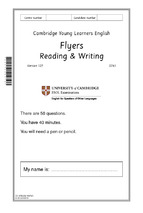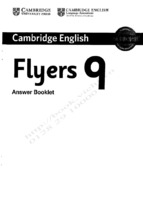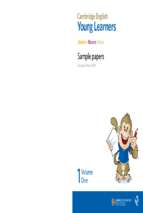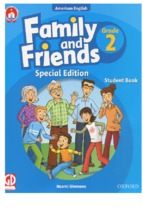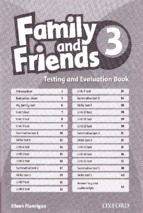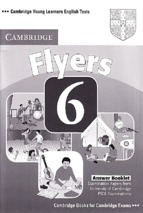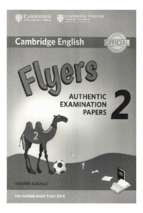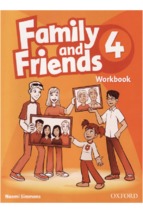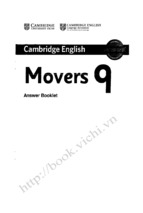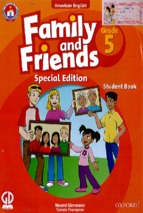Michael_vince_with_paul_emmerson_fce
Macmillan Education
Between Towns Road, Oxford OX4 3PP
A division of Macmillan Publishers Limited
Companies and representatives throughout the world
ISBN 1 405 00765 6 without key
ISBN 1 405 00766 4 with key
Text © Michael Vince 2003
Design and illustration © Macmillan Publishers Limited 2003
First published 1993
This edition published 2003
All rights reserved; no part of this publication may be
reproduced, stored in a retrieval system, transmitted in any
form, or by any means, electronic, mechanical, photocopying,
recording, or otherwise, without the prior written permission
of the publishers.
Designed by Mike Brain Graphic Design Limited
Layout and composition by Mike Brain Graphic Design Limited
Illustrated by:
Rowan Barnes-Murphy pp 9, 42; Ben Hasler pp 3, 218;
Ian Kellas pp 96, 97; Gillian Martin pp 141; Janek Matysiak pp 227, 232, 260;
Julian Mosedale pp 53, 78, 103, 120, 121, 129, 143, 155, 183, 202, 264, 289;
David Parkins pp 18, 145; Martin Shovel pp 36, 61, 84, 107, 127, 135, 153, 160,
192, 214, 248, 282, 295; Bill Stott pp 94, 100, 111.
Photographs by:
Eyewire, Photodisc and Andrew Oliver.
The author would like to thank the many schools and teachers who
have commented on these materials. Also special thanks to
Paul Emmerson and Sarah Curtis.
Printed and bound by Scotprint
2007 2006 200S
10 9 8 7 6 5 4
Contents
Introduction
vii
iii
FIRST C E R T I F I C A T E L A N G U A G E P R A C T I C E
FIRST C E R T I F I C A T E L A N G U A G E P R A C T I C E
VI
Vocabulary
1
Travel and holidays
203
Vocabulary
2
Work and employment
208
Vocabulary 3
Sport and leisure
213
Vocabulary
Clothes and appearance
218
Vocabulary 5
Towns and buildings
222
Vocabulary
6
Vehicles and transport
227
Vocabulary
7
Food, restaurants and cooking
231
Vocabulary
8
Shops and shopping
235
Vocabulary
9
Crime and the law
240
Vocabulary 10
Entertainment and the arts
245
Vocabulary 11
The natural world
250
Vocabulary 12
People and behaviour
254
Vocabulary 13
Technology and machines
259
Vocabulary 14
Problems
264
Vocabulary 15
Health and the body
269
Vocabulary 16
Money
274
Vocabulary 17
Feelings and opinions
278
Vocabulary 18
Education and learning
282
Vocabulary 19
Word formation 1
287
Vocabulary 20
Word formation 2
291
Vocabulary 21
Collocations
296
Formation rules
300
Word list
302
Grammar index
311
Grammar answers
313
Vocabulary answers
330
4
This book is designed to revise and consolidate grammar points at the level of
First Certificate. It also provides practice in key lexical areas.
There are regular consolidation units which include forms of testing commonly
used in the First Certificate examination.
It can be used as a self-study reference grammar and practice book, or as
supplementary material in classes preparing for examinations.
If used for classwork, activities can be done individually or co-operatively in
pairs or small groups. The grammatical information provided can be used for
reference when needed, or worked through systematically
The grammar section includes recognition and concept-checking activities, as
well as production activities.
Each vocabulary section includes focus on phrasal verbs, prepositions and
particles, and collocations.
Explanations
Describing events
•
in the past
M a i n events
The past simple is used to describe finished actions and events in the past.
Susan went into the station and bought a ticket.
- Background description
The past continuous is used to describe actions in progress in the past. It
gives information about the background situation.
There were a lot of people waiting in the station. Some were sleeping on the
benches, and others were walking up and down. Susan was looking for
Graham, so she didn't sit down.
•
Past before past
The past perfect is used to make it clear that one past event happens before
another past event. We use the past perfect for the earlier event.
By the time the train arrived, Susan had managed to push her way to the front
of the crowd.
It is not always necessary to use the past perfect if a time expression makes
the order of events clear.
Before the train arrived, Susan managed to push her way to the front of the
crowd.
- Past continuous used with past simple
We often use the past continuous first to set the scene, and then the past
simple for the separate, completed actions that happen.
Susan was looking for Graham, so she didn't sit down. Instead, she tried
calling him on her mobile phone.
We often contrast an action in progress with a sudden event which
interrupts it.
While Susan was trying to get onto the platform, a man grabbed her
handbag.
Habits in the past
•
Participle clauses
Participle clauses are introduced by the time expressions before, after and
while. They have the same subject as the following clause.
After struggling with him, Susan pulled the bag from his hands.
•
Past simple
The past simple is used to describe past habits or states. A time expression is
usually necessary.
/ always got up at six in those days,
(habit)
/ lived in Austria for several years.
(state)
1
FIRST C E R T I F I C A T E L A N G U A G E P R A C T I C E
•
Used to
Used to is used to describe past habits or states. A time expression is not
necessary.
J used to get up at six, but now I get up at eight.
I used to own a horse. (I owned a horse once.)
With negatives and questions used to becomes use to.
I didn't use to like beer.
Did you use to swim every day?
When we use used to we suggest that the action is no longer true and so
make a strong contrast with the present.
Politeness and
uncertainty
2
•
Would
Would is used to describe a person's typical activities in the past.
It can only be used to describe repeated actions, not states. It is mainly used
in writing, and in personal reminiscences.
Every evening was the same. Jack would turn on the radio, light his pipe and
fall asleep.
•
Past continuous
The past continuous can be used to describe a repeated action in the past,
often an annoying habit. A frequency adverb is necessary.
When Peter was younger, he was always getting into trouble.
We can use the past continuous with think, hope and wonder to give a polite or
uncertain meaning.
I was thinking of having a party next week.
I was hoping you would join us at the cafe tonight.
I was wondering if you could help me.
GRAMMAR 1
PAST T I M E
Choose a suitable description for each picture.
a) When he left the house, Peter forgot that he had put his passport and wallet
in his other jacket.
b) After phoning the airport, Peter packed his suitcase.
c) When he returned from Portugal in March, Peter put his passport and wallet
in his jacket pocket.
d) A few days before leaving for his summer holiday, Peter phoned the airport
to check his flight.
e) While Peter was packing his suitcase, he realised that he hadn't checked his
flight.
f) While Peter was packing his suitcase, the phone rang.
FIRST C E R T I F I C A T E L A N G U A G E P R A C T I C E
2
Underline the most suitable verb form in each sentence. The first one is done for
you.
a) I suddenly remembered that I forgot/had forgotten my keys.
b) While Diana watched/was watching her favourite television programme, there
was a power-cut.
c) Tom used to live/would live in the house at the end of the street.
d) Who was driving/drove the car at the time of the accident?
e) By the time Sheila got back, Chris went/had gone.
f) David ate/had eaten Japanese food before, so he knew what to order.
g) I did/was doing some shopping yesterday, when I saw that Dutch friend of
yours.
h) I used to like/was liking sweets much more than I do now.
i) What exactly were you doing/did you do when I came into your office
yesterday?
j) Laura missed the party because no-one was telling/had told her about it.
k) Tanya would/used to be a doctor.
3
Put each verb in brackets into a suitable past verb f o r m . Only use the past perfect
where this is absolutely necessary.
a) While I (try)
was
trying
to get my car started, a passing car (stop)
and the driver (offer)
b) The police (pay)
to help me.
no attention to Clare's complaint
because she (phone)
them so many times before.
c) Mary (not wear)
her glasses at the time, so she (not notice)
what kind of car the man (drive)
d) Nick (lie)
down on the grass for a while, next to some
tourists who (feed)
the ducks.
e) Tony (admit)
that he (hit)
the
other car, but said that he (not damage)
f) Sorry, I (not listen)
it.
to you. I (think)
about something else.
g) Helen (feel)
very tired, and when she (finish)
her work, she (fall)
h) The police (get)
asleep.
to Clare's house as fast as they could,
but the burglars (disappear)
i) I (phone)
you last night but you (not answer)
What (you do)
j) We (not go)
4
?
out yesterday because it (rain)
GRAMMAR 1
4
PAST T I M E
Decide whether the verb form in italics is suitable or unsuitable.
a) While I had a bath, someone knocked on the door
unsuitable...
b) Sally didn't go to a boxing match before
c) Harry tried to repair the car, but he didn't really know what he was doing.
d) What did you wear to the Ponsonby's party?
e) Were you eating spaghetti every day when you lived in Italy?
f) I didn't know you had bought a new car
g) They all wanted to believe her, but suspected she was lying
h) As Peggy walked home, she tried to remember what happened
i) 'What a terrible day!' thought Lucy. Everything had gone wrong!
j) Although it rained a lot, I was enjoying my holiday last year
5
Put each verb in brackets into a suitable past verb f o r m .
When Professor Mallory, the famous archaeologist, (1) ...invited.
(invite) me to take part in his expedition to find the Lost City of the Himalayas,
I (2)
(3)
(not hesitate) to accept his invitation. Mallory
(discover) an ancient map showing the position of the
city, although no European (4)
(ever go) to the area before.
In fact, most of Mallory's colleagues either (5)
that the city (6)
(believe)
(never exist) or (7)
that it (8)
(feel)
(vanish) long ago and (9)
(become) simply a legend. According to the Professor, the builders of the city
(10)
(hide) it among the mountains in order to protect its
immense riches. He (11)
(believe) that the descendants of
these ancient people (12)
(still keep) themselves apart from
the rest of mankind for the very same reasons. So when we
(13)
(set off) on a cool May morning towards the distant
mountains, each of us (14)
(look forward) to exciting
discoveries. For a week or more we (15)
(climb) higher and
higher, following the map, which Mallory (16)
time to time. Then one afternoon, while we (17)
top of a valley, we (18)
(19)
whose clothes (20)
(study) from
(rest) at the
(notice) that a rider on a horse
(wave) at us from the other side of the valley. A rider
(shine) like gold!
FIRST C E R T I F I C A T E L A N G U A G E P R A C T I C E
6
Rewrite each sentence beginning as shown. Use a participle clause.
a) Norman collected the parcel, but then he realised it was the wrong one.
After collecting the parcel, Norman realized it was the wrong one.
b) Sue left the house but first she checked that she had her keys.
Before
c) Mark was parking his car when he noticed the wing-mirror was broken.
While
d) Julia cleaned the house, but then she fell asleep on the sofa.
After
e) Brian bought a new television, but first he checked all the prices.
Before
f) Alan was skiing in Switzerland and met his old friend, Ken.
While
g) Kate took two aspirins, and then she felt a lot better.
After
h) Sheila went out for the evening, but first she washed her hair.
Before
Key p o i n t s
1
2
3
4
5
6
The past simple describes completed events in the past, such as the main events
in a narrative. It can also describe habits and routines in the past.
The past continuous is used for:
a) background description.
b) actions in progress, often contrasted with a sudden event.
The past continuous cannot be used to describe past routines and habits.
Participle clauses can introduce a clause giving the main event.
The subjects of both clauses must be the same.
The past perfect describes a past event which took place before another past
event. If before or after is used, the past perfect is optional.
The past perfect is not used for an event that happened a long time ago in the
past.
Used to only refers to past time, and has no present form.
Would can be used to describe habitual actions in the past, usually in writing. It
does not make such a strong contrast with the present as used to. Compare:
Jim would always make his mother a cup of tea after lunch.
Jim used to drink tea, but now he prefers coffee.
Would cannot be used to describe states.
Sally used to be a dancer.
Explanations
Recent events
Present perfect simple
The present perfect simple is used to describe recent events.
I've left my shopping bag behind.
The event happened in the past, but there is a result in the present.
I've broken my arm, as you can see.
No definite time is given for the event, but to emphasise the idea of recentness
we can use just.
I've just broken my watch.
We can also describe events that have not happened.
/ haven't found her phone number yet.
Indefinite events
•
Present perfect simple
No definite time is given for the events. They are a series of actions in our
life up to now.
I've been to France three times.
After It's/This is the first/second time we use the present perfect. It also refers
to our life up to now.
This is the first time I have eaten Japanese food.
•
Compared with past simple
Events described using the past simple have definite times.
/ went to France last year.
I ate at a Japanese restaurant on Saturday.
If we think of a definite place for an event, this may suggest a definite time.
/ left my shopping bag on the train.
•
Present perfect simple
The present perfect simple describes a state which lasts up to the present.
I've lived in this house for five years.
The present perfect simple can describe a habitual action in a period of time
up to the present.
I've never worn a tie to work, and I refuse to start now!
•
Present perfect continuous
The present perfect continuous can also describe a state which lasts up to the
present moment.
I've been living in this house for five years.
There is little difference in meaning between simple and continuous in this
case, or with How long questions.
How long have you lived/been living in this house?
The verbs wait, sit, lie, stay prefer the present perfect continuous.
I've been waiting for ages.
Extended or
repeated events
7
FIRST C E R T I F I C A T E L A N G U A G E P R A C T I C E
For, since, ago
See Grammar 14 for contrast between these time expressions.
Present perfect
simple or
continuous?
•
Completed action
The present perfect simple can show that an action is complete.
I've finished my homework!
If we say how many or how much we use the simple form. A certain amount
has been completed.
I've written ten pages of my homework!
•
Not completed
The present perfect continuous can show that an action is not completed, or
that it has finished recently.
We've been walking for hours! Let's have a rest.
I've been digging the garden. That's why I'm so dirty!
•
Present result or action in progress
We use the present perfect simple if our attention is on the present result.
I've written my homework. Now I can watch the television.
We use the present perfect continuous if our attention is on the action in
progress.
I've been writing my homework all evening! I didn't know it would take so
long.
8
GRAMMAR 2
P R E S E N T PERFECT
Choose a suitable description for each picture.
a)
l) Did you enjoy the match?
2) Have you enjoyed the match?
b)
1) What have you been doing?
2) What have you done?
C)
1) He was married six times.
2) He has been married six times.
d)
1) How long have you been here?
2) How long are you here for?
e)
1) I've been waiting for two hours.
2) I waited for two hours.
f)
1) Where did Wendy go?
2) Where has Wendy been?
9
FIRST C E R T I F I C A T E L A N G U A G E P R A C T I C E
2.
Underline the most suitable verb form in each sentence.
a) Did you see/Have you seen my bag anywhere? I can't find it.
b) Larry is writing/has been writing/has written his novel for the last two years.
c) From the minute he got up this morning Gary asked/has asked/has been asking
silly questions!
d) Have you given/Did you give Helen my message when you have seen/saw her?
e) Sorry, could you say that again? I didn't listen/haven't listened/haven't been
listening to you.
f) The police think that they found/have found your wallet, so call this number.
g) Did you two meet/Have you two met before? Eric, this is Amanda,
h) Did you meet/Have you met anyone interesting at the reception?
3
Put each verb in brackets into a suitable verb f o r m .
a) I'm sorry about not coming last week. I (have)
cold and so I (stay)
had.
a
at home.
b) Wait a minute! I (have)
an idea. Let's go and see
Roger. We last (see)
him a long time ago.
c) It's nice to be back here in London. This is the second time I (come)
here.
d) I'm phoning about your bicycle for sale, which I (see)
in the local paper. (you sell)
it? Or is it still available?
e) This place is in a terrible mess! What on earth (you do)
?
f) And now for an item of local news. Hampshire police (find)
the dangerous snake which (go)
missing earlier in the week.
g) This tooth (kill)
me lately! So I (make)
an appointment with the dentist for next Tuesday.
h) I can't give you the report I (promise)
because I (not finish)
4
it.
Underline the most suitable time expression.
a)
b)
c)
d)
e)
f)
g)
h)
i)
.j)
10
for today
I haven't seen Gerry for/since a long time. How is he?
It's ages ago/since I last went to a football match.
I've written to Deborah last week/recently.
What have you been doing today/yesterday?
Have you eaten Italian food before/already?
I've been living here in/since the end of last year.
Actually I had dinner with Sue last night/lately.
I've been trying to get in touch with David for ages/for the last time.
Terry hasn't been to Edinburgh since/when we went there together.
I can't remember how long/when I've had this watch.
GRAMMAR 2
5
P R E S E N T PERFECT
Complete the second sentence so that it has a similar meaning to the first
sentence, using the w o r d given. Do not change the w o r d given. You must use
between t w o and five words, including the w o r d given.
a) Steve started learning the violin a month ago.
learning
Steve
has
been
learning
the violin for a month.
b) I haven't been to an Indian restaurant for ages.
since
It's ages
an Indian restaurant.
c) When she heard the results, Mary began to feel more confident.
become
Since hearing the results
more
confident.
d) The last time Nancy came here was in 1986.
since
Nancy hasn't
1986.
e) This is my first visit to Japan.
time
This is the first
to Japan.
f) How long have Helen and Robert been married?
get
When
married?
g) Jack bought those trousers last month, and has been wearing them ever
since.
for
Jack has
a month.
h) It's a long time since our last conversation.
spoken
We
long time.
i) Thanks, but I had something to eat earlier.
already
Thanks, but I've
eat.
j) This is my first game of water-polo.
played
I
before.
11
FIRST C E R T I F I C A T E L A N G U A G E P R A C T I C E
6
Put each verb in brackets into either the present perfect simple or the present
perfect continuous.
a) Someone (eat)
has
eaten
all the cakes. I'll have to buy some more.
b) What (you buy)
your sister for her birthday?
c) My throat is really sore. I (sing)
all evening.
d) Brenda (learn)
Russian, but she finds it difficult.
e) How many people (you invite)
to your party?
f) Those two cats (sit)
on that branch for the last hour.
g) It (rain)
all day! Why can't it stop?
h) Diana (wear)
twelve different dresses in the past week!
i) I (do)
everything you asked. What should I do now?
j) Graham and Pauline (try)
to find a house for ages,
but they can't find one they can afford.
7
Put each verb in brackets into either the past simple, the present perfect simple,
or the present perfect continuous.
It was announced in London this morning that the British Oil Corporation
(1)
...has
discovered
(discover) oil under the sea near the Welsh coast.
The company, which (2)
(drill) for oil in the area since
2001, (3)
(find) small amounts of oil near Swansea last
month, and since then (4)
(discover) larger amounts
under the seabed nearby. Last year the government (5)
(lend) over £50,000,000 to BOC, and (6)
(give)
permission for the company to build an oil refinery and other facilities in South
Wales.
The reaction of local people to today's news (7)
(be) mixed so far. Local MPs (8)
(already welcome) the
news, pointing out that the oil industry will bring badly needed jobs to the
area. But local residents are worried about the danger of pollution. 'Nobody
(9)
(ask) us yet what we want,' said Ann Griffiths,
leader of the Keep Out The Oil Campaign. 'Look what
(10)
(happen) when they (11)
(find) oil in Scotland in the 1960s. The oil companies
(12)
(get) rich, not the local people. BOC
(13)
(not tell) us the truth about what this is going to
mean for our people.' A BOC spokesman later (14)
(refuse) to comment. Meanwhile local campaigners
(15)
12
(ask) the government to hold an inquiry.
- Xem thêm -

